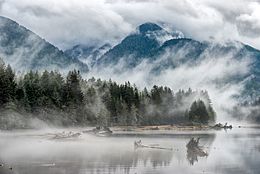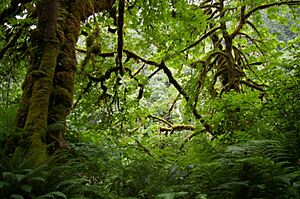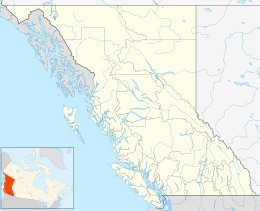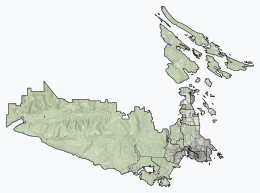San Juan Valley (Vancouver Island) facts for kids
Quick facts for kids San Juan Valley |
|
|---|---|

View up the San Juan Valley from Pacheena Reserve 1
|
|
| Length | 32 km (20 mi) East-West |
| Width | 3.8 to 7.5 km (2.4 to 4.7 mi) |
| Geography | |
| District | Capital Regional District |
| Traversed by | Pacific Marine Road |
| Rivers | San Juan River |
The San Juan Valley is a beautiful valley found on Vancouver Island in British Columbia, Canada. It's part of the Capital Regional District, which is an area managed by a local government.
This valley is quite small. The only towns or communities you'll find here are Port Renfrew and the lands of the Pacheedaht First Nation.
Contents
A Look at the Valley's Past
The San Juan Valley has been home to the First Nations of Vancouver Island for a very long time. They have lived here for countless generations.
An Old Story of Discovery
There's an old story from the First Nations about a Spanish ship that arrived on the coast in 1777. The ship anchored in Port San Juan. The Spanish sailors traded with the Nitinat Natives, who are a First Nation group.
The story says the Spanish found gold in the San Juan River. When they tried to collect the gold, there was a conflict with the Nitinat Natives. Later, another Spanish group found two Spanish women who had been taken in the conflict. When these women were returned, the later Spanish group accidentally brought a sickness to the Nitinat Natives.
Some historical records support parts of this story. Spanish ships did explore the west coast in the 1700s. There are also records of clashes between First Nations and Spanish explorers. This story is believed to be the first time gold was found in the San Juan River.
Exploring the Valley's Geography
The San Juan Valley is surrounded by mountains and other valleys. To the north, the Seymour Range separates it from the Cowichan Valley. To the south, a mountain ridge separates it from the Loss Creek and Jordan River valleys.
The San Juan River flows right through the middle of the valley. It flows from east to west and eventually empties into Port San Juan. The valley also has three small, pretty lakes: Fairy Lake, Lizard Lake, and Pixie Lake.
How the Valley Formed
The valley sits on what's left of something called the Pacific Rim Terrane. Imagine huge pieces of Earth's crust (called terranes) slowly moving and crashing into each other. This Pacific Rim Terrane was squeezed between two other large pieces: the Wrangellia to the north and Siletzia to the south. This special land area stretches all the way from the Pacific Ocean in the west to Victoria in the east.
Weather and Nature
The San Juan Valley has different types of weather depending on where you are. The western part of the valley is close to the Strait of Juan de Fuca. This gives it an Oceanic climate, which means it has cool summers and mild winters. Further inland, the valley has a warm-summer Mediterranean climate. This means it has warm, dry summers and mild, wet winters.

Plants and Trees
The San Juan Valley is part of a temperate rainforest. This type of forest is known for its tall, coniferous (cone-bearing) trees. You can find many "big trees" here, like:
- Western hemlock
- Western red cedar
- Pacific silver fir
- Yellow cedar
- Douglas fir
- Grand fir
- Sitka spruce
- Western white pine
You'll also see other plants like the bigleaf maple, red alder, sword fern, and red huckleberry.
Amazing Old Forests
The valley is special because it has some of the biggest and oldest old-growth forests left on Vancouver Island. These are forests that have grown for hundreds or even thousands of years without being cut down.
Some famous trees here include the Red Creek fir. This is the largest Douglas fir tree in the entire world! Another famous tree is the San Juan Spruce, which used to be the second largest Sitka spruce in the world. These giant trees are truly amazing to see.
 | Ernest Everett Just |
 | Mary Jackson |
 | Emmett Chappelle |
 | Marie Maynard Daly |



